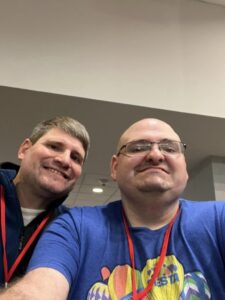By Dana Trick
In my last blog post I wrote about how the representation of autism and characters with autism are mostly poorly done and act like a walking bag of stereotypes as a result.
Though I did mention that these poor representations had made me hesitant to watch shows that had an autistic character, it didn’t mean that I couldn’t find characters that I can relate to as an autistic, despite the character itself isn’t officially acknowledged as autistic by the creator.
Throughout my childhood and my current adult years, I’ve consumed a lot of shows and books that featured characters that either had a disability (or what is considered a disability in their fictional world) and/or display various traits that are very similar to my autism and ADHD.
When I was growing up and was still unaware of my diagnosis I knew I wasn’t like the other kids and I would often relate to the physically disabled characters more than other abled characters.
After I became aware of my autism, my mom tried to get me interested in shows that feature autistic characters but I wasn’t able to get interested in them.
I’ll admit that I used to relate to Sheldon during The Big Bang Theory’s early seasons, but my interest in that show was not long-lived and I knew that the show’s representation of Sheldon’s autism/Asperger’s as well as its depiction of nerds was very wrong and mean-spirited.
However, the shows and books I consumed would occasionally have characters that I felt behaved very autistic which would make me immediately relate to them.
Eventually, as I got involved and fell in love with those particular characters, I started to believe that they were autistic but were undiagnosed and/or simply thought that the author wrote these autistic traits in these characters unintentionally. I really didn’t care about whether the authors’ confirmation of those characters having autism or not—I was just really happy that there was a character that I could relate to.
As I consumed more various forms of entertainment and became more involved in nerd communities in my teenager and young adult years, I learned about headcanons. As defined by the Merriam-Webster on-line dictionary website,
a headcanon is when an idea is held amongst a group of fans of a certain show, movie, book series, and/or comics as official to themselves despite that idea not openly considered accept that idea to be official (or canon) in the work by the creator of that piece of work.
I initially thought that headcanons were a type of fan theory created by someone who had little knowledge of autism and is subject to debate, or simply a fan’s opinion that deserved to be treated with respect. Still under the influence of my internalized ableism, I first arrogantly rejected these headcanons on the basis on they were made by neurotypicals who only understood autism by its negative and positives stereotypes. However, as I matured as an autistic adult and gluttonous consumer of entertainment and arts, these autistic headcanons became appealing to me. Once read comments on various YouTube and other fan-websites that explained why a certain character in a certain show, movie, book series, or comics was autistic, I became more accepting of those headcanons.
With this acceptance of headcanons, each time I read a story or watched a show that has a character who act like me, I feel less alone but due to the un-officialness of head cannons, I often feel like I must defend myself and that character to another form of the ablest “You don’t look autistic” from people who love, enjoy, and seek comfort in the same show, movie, and/or books that I love and care about.
Subtle ableism is so much more horrible and more prevalent that open ableism.
There’s this certain hostility towards about having headcanons in most fan and nerd communities as some fans who miraculously talk in a very loud and echoing voice in the internet that discourage it and actively attack that headcanon.
Nonetheless, most of the on-line conversations concerning these autistic headcanons were mainly polite and respectful to both sides. One of the most counterarguments is that there are some people who do display autistic traits but don’t have autism. Obviously, there is no denying that fact of life and it a considerable argument, but it should be remembered that autistics display their autism in different and various ways that don’t include quietness, lack of social skills, and/or “savant.”
Also, there are individuals that share some characteristics of autism such as robot-like behavior and/or lack of social understanding but aren’t autistic.
Furthermore, there isn’t enough forms of entertainment that have autistic characters who are portrayed with the same level of writing and care as the abled characters, and those who do have them often portray them in either childishly pure or socially-inept savant stereotype—and that lazy writing is treated like it’s a good thing by normal people, which makes them lose their relatability.
In contrast, having these autistic headcanons had given me and other autistic fans more support and encouragement than a majority of shows and movies that have an autistic character. Yes, most of us know that our autistic headcanons would most likely be never made official and there is a possibly these characters are more alike to individuals with robot-like behavior and socially awkwardness. These headcanons make us feel so much less alone. The autistic headcanons are just another way for us to represent ourselves on our own terms in the worlds and stories and characters that we love!
Nonetheless, in recent years in entertainment and the arts, there is a rise in good writing for autistic characters. Plus, some shows such as the SHE-RA reboot officialized the autistic headcanon for some of their characters. This a great progression from the subpar representation I had to deal with growing up, and I want to see more of them in media in the near future, hopefully with acceptance and diversity.

Dana resides in Moorpark, California. She spends too much of her time reading books (fantasy, fiction, history, poetry, comics), drawing weird things that suddenly appear in her head, writing stories and poems and listening to a strange assortments of music genres that she isn’t sure what type of music fan she is.









Great perspective! Would be amazing if you’d submit something to the Matilda Squared Mag which is looking at autistic headcanons & other autistic representation. More info at @autism_in_pop_culture on Instagram or email busybeingdisabled@icloud.com
Why Headcanon?
I know #Canon #disabilityinclusion is really cool! I think saying #Headcanon “Isn’t a replacement” for #Canon representation disregards the amount of work put into undoing #InternalizedAbleism and loving your #disabled self to do a #Headcanon. There’s also the practical work that goes into writing one, thinking of how to counter every objection Ableists could come up with. These #ActuallyAutistic #Headcanons there’s such a loving attachment for your #SpecialInterest. I grew up watching Disney’s Beauty and the Beast, and Belle was my first Autistic Headcanon, but Beauty and the Beast is part of the story of my life regardless of my autism. to use the word “Replacement” implies that my love for anything I have headcanoned can be given up, which would mean change which is emotionally devastating to my Autistic self. So I want canon disabled representation, but it shouldn’t come at a price.